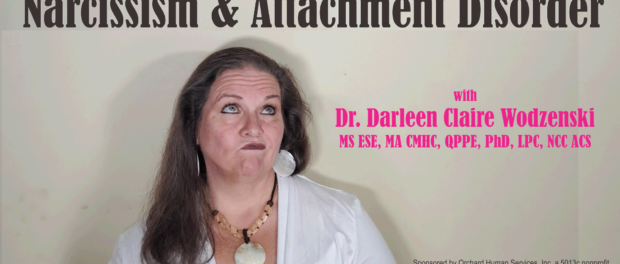Narcissism, Attachment Disorder, RAD
 Parents with Narcissism can worsen or be the cause of RAD and Attachment Disorder. Learn more at DrDarleenClaire.com or OrchardHumanServices.org
Parents with Narcissism can worsen or be the cause of RAD and Attachment Disorder. Learn more at DrDarleenClaire.com or OrchardHumanServices.org
Reactive Attachment Disorder, or RAD, and Disinhibited Social Engagement Disorder, or DSED, are challenging developmental disorders of childhood that are sometimes made worse or even caused by a parent who is Narcissistic. When this occurs, the parent with narcissism often actively blocks the child’s ability to bond with the healthy stable parent, in order to remain dominant and in control. This prevents the child’s bonding with either parental figure, and can contribute to serious psychopathology and developmental disorder, even including Attachment Disorder.
Naturally, we encourage parents of all children with emotional, developmental, behavioral, and family issues to seek professional mental health services. Sadly, highly competent therapists and counselors may stabilize the child and even promote parent-child bonding, and this could anger the narcissistic parent. Typically, the narcissist does not want those around them to be stable, autonomous, or healthy. So the narcissistic parent often interferes with competent mental health services in order to maintain chaos and instability in the family. Nevertheless, it is important for the stable parent to at least make an attempt to secure counseling services for children in the household, who are certain to be negatively impacted by living under the rule of a narcissist.
Whenever possible, we encourage the stable parent to recruit help from wherever possible. If the child goes to school, the school counselor is a likely ally to help monitor the child’s mental state and provide support if challenges arise on school grounds. The stable parent can also inform the child’s pediatrician and other care providers about the narcissistic abuse in the home; they will then be on the look out for signs of physical or mental distress that might signal the need for supportive services. If the narcissism is serious enough, Child Protective Services may need to be called for help.
If the situation becomes serious enough, the stable parent may need to recruit the support of law enforcement, a battered women’s center, and even seek relief from the courts. When properly documented for a judge, the stable parent may be able to benefit from court decisions about visitation, resources, and accessing services. In some cases, judges can order the child and parents to engage in counseling as a provision of the parenting plan that is part of divorce proceedings.
Want to know more about the intersection between narcissism and attachment disorder? Follow Dr. Darleen Claire Wodzenski on YouTube and look for new videos, books and blogs on the topic. Or contact Orchard Human Services, Inc. to access services, consultative support, parent or professional training, or invite Dr. Darleen to speak at your function or event. DrDarleen@OrchardHumanServices.org (770) 686-0894.
















